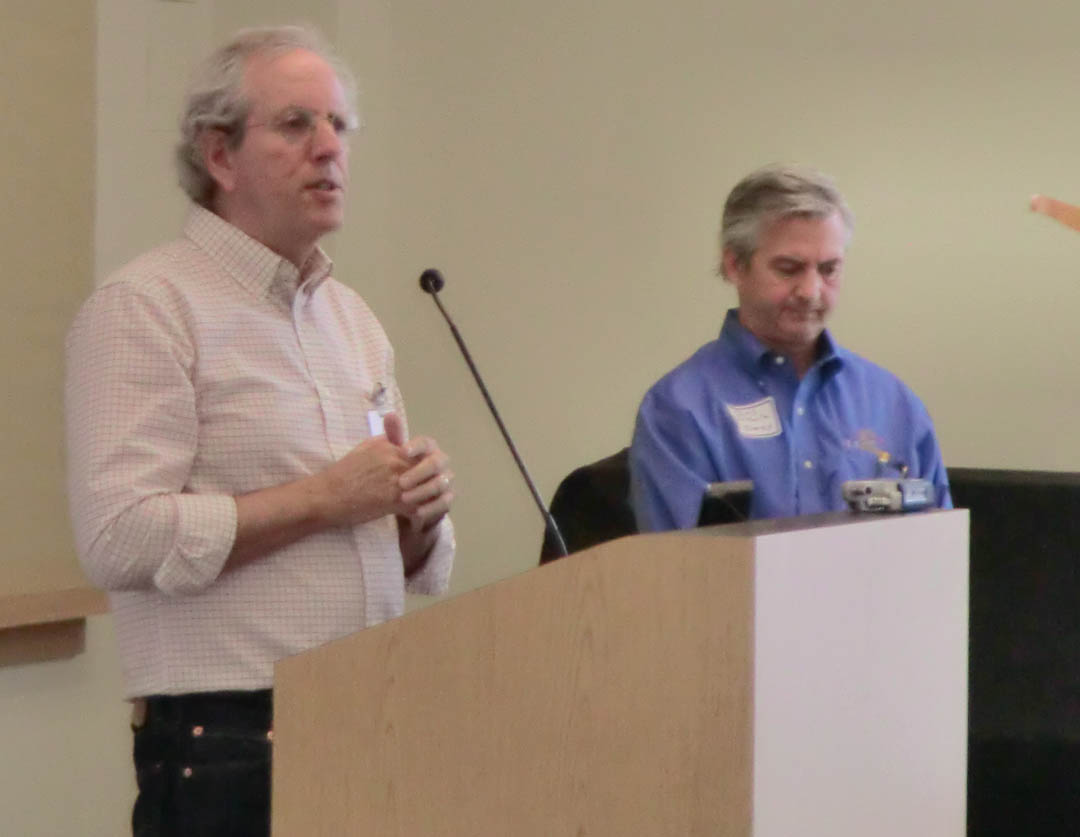College News
CCCC-Pittsboro shines on Day of Solar Activities
Notice: This article is older than 12 months. Names, contact information, programs, titles, etc. might have changed. If you have any problems please call the main college number, 1-800-682-8353, and we will be happy to direct you accordingly.

click image to enlarge ⊗
John Delafield (left), Central Carolina Community College’s renewable technologies director, ... (more)
03.28.2011 • College & Community • Special Events
PITTSBORO — With the sun shining so brightly, Wednesday was the perfect setting for Central Carolina Community College’s Pittsboro campus to host its Day of Solar Activities.
Workshops and solar power-related activities combined with an official announcement of CCCC’s partnership with FLS Energy to generate solar power with panels on the top of two of the Pittsboro campus’ buildings. The event educated hundreds through the course of the day on what solar power entails, how the college is working to integrate solar power into its existing energy curriculum, and exactly what the benefits of solar power are.
The day’s centerpiece was the official announcement of partnership with FLS Energy, an Asheville-based energy firm, which states its goal as “making solar mainstream.” Through the agreement, solar power culled by the panels placed on the Pittsboro campus rooftops will be sold into existing power grids, generating revenue for both the college and the company. CCCC paid no money up-front for the installation of the panels (which FLS owns) but will receive annual lease payments for the first decade of the 25-plus year agreement.
Environmental benefits of the agreement include 124 tons of carbon emissions avoided on an annual basis, the equivalent of planting 373 trees each year, and the equivalent of taking 31 vehicles off the road each year.
Chris Wachholz of FLS Energy called the Pittsboro campus “a flagship campus and program on environmental education.”
“Our vision is making solar mainstream, and I was talking to a friend about how we would know when that had happened,” Wachholz said. “My friend said we’d know when solar power showed up on a ‘Monopoly’ board. So I went to the Hasbro web site, and sure enough, on the newest edition of ‘Monopoly,’ solar power has replaced the old electric utility. It’s become a mainstream business strategy instead of just good environmental policy.”
According to Wachholz, the solar technology market increased by 67 percent in 2010.
But the programming at CCCC isn’t necessarily aimed at replacing more traditional energy technologies, but at supplementing those courses of study so that students entering the workforce will have the required skills to work in either of the sectors — or both.
Andrew McMahan, director of the N.C. Association of Community Colleges’ Energy Curriculum Improvement Project, explained that his program has been working to update energy-related curricula across the state to that very end.
“North Carolina has the third biggest community college system in the country and serves 850,000 students,” he said. “So in the realm of renewable energy, the state is trying to become a leader in providing opportunities for people all over the place.”
The Energy Curriculum CIP aims to revise programs so that they integrate green and sustainability technology with those that already exist.
“At the end of the day, the skills for renewable energy are very similar to those of more traditional energy industries. What we’re looking to do is create opportunities for students, not restrictions,” he said, explaining that the skills used in solar photovoltaics are similar to those used in electrical and electronics engineering, while those useful for wind technology line up with both electrical and electronics engineering as well as industrial systems.
“This also benefits the companies by removing barriers between the two types of technology. If you’re a company using traditional energy and you’ve hired 10 people who have skills in renewable energy, suddenly you’re able to consider using renewable energy if that option works for you.”
McMahan said revising existing curricula in order to adapt to changing technology is a cost-saving measure.
“New programs cost the state a lot of money,” he said. “So instead of that, we’re utilizing existing faculty and curricula and we’re almost done before we’ve started. What we want to do is create a repeatable model for the entire United States.”
CCCC serves as the lead college in the energy sector of the Energy Curriculum CIP. Other sectors of the CIP include building, engineering, transportation, and environment.
For more information on CCCC’s Sustainable Technologies course offerings, contact the Pittsboro campus at (919) 542-6495 or visit www.cccc.edu/green.
Categories
- Admin, Faculty & Staff Category
- Arts & Entertainment Category
- Clubs Category
- College & Community Category
- College General Category
- Continuing Education Category
- Curriculum Programs Category
- Distance Education Programs Category
- Facilities/Buildings Category
- Finances Category
- Foundation Category
- Graduations Category
- Lee Early College Category
- NCCCS Category
- SGA Category
- Special Events Category
- Sports Category
- Students/Graduates Category
- Uncategorized Category
Archives

